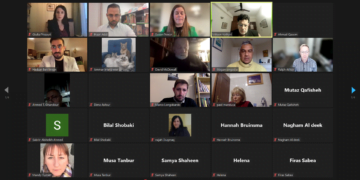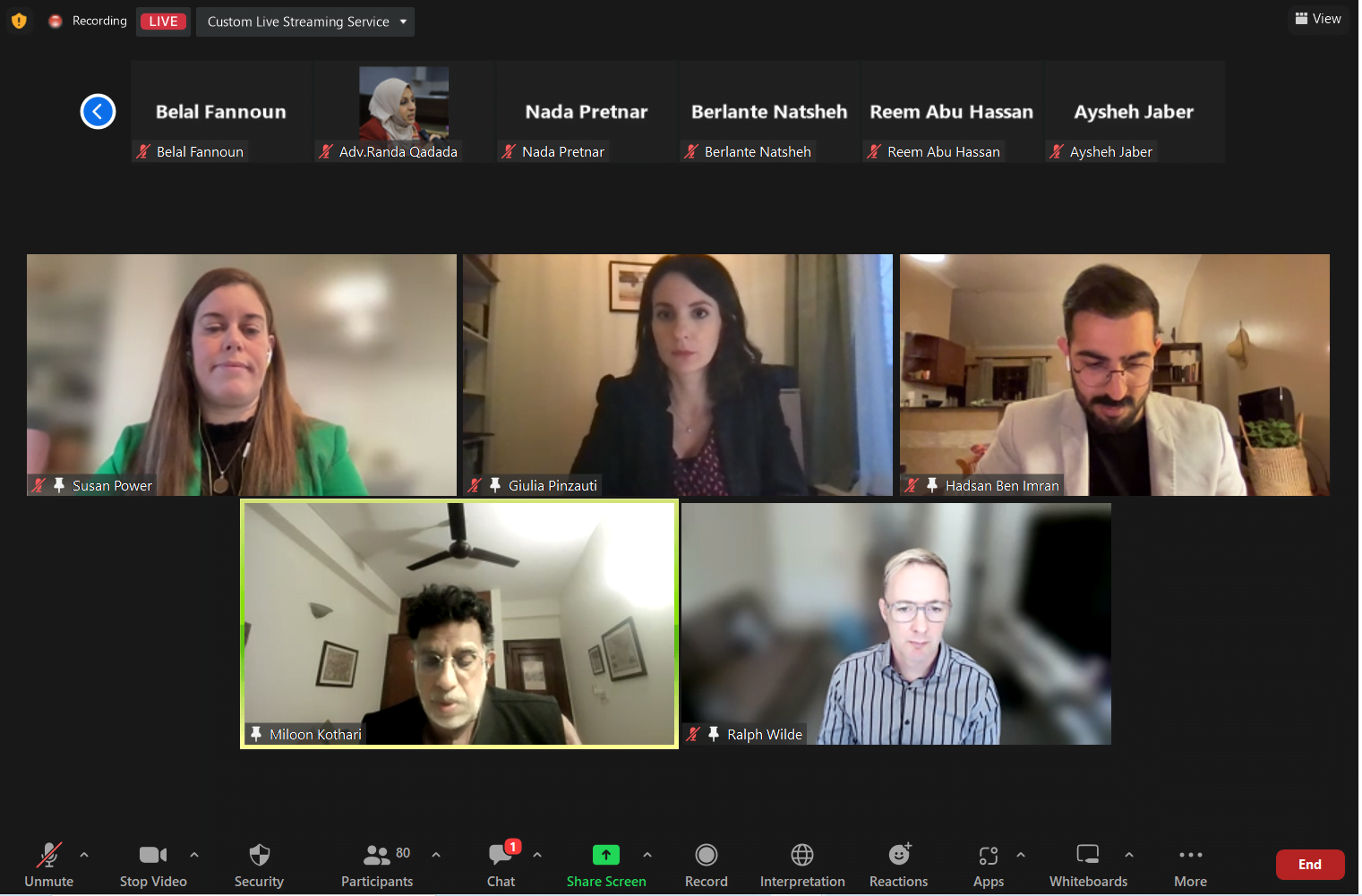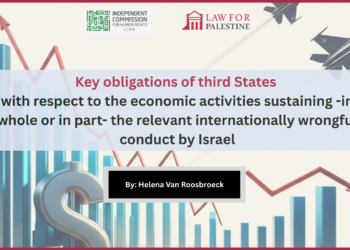Experts in a Webinar Organised by Jurists for Palestine Forum: The Israeli Occupation is Illegal, and the Awaited ICJ Advisory Opinion Shall Establish the International Responsibility to Dismantle it
Law for Palestine, in partnership with the Arab Renaissance for Democracy and Development (ARDD), and as part of “Jurists for Palestine Forum” project, organized a webinar entitled “On the Table of the International Court of Justice (ICJ): The Legality/Illegality of Israeli Occupation and the Subsequent International Responsibility”.
The webinar, which is the ninth in the second season of the Jurists for Palestine Forum, addressed the question referred to the ICJ on the legality/illegality of the Israeli occupation, including the ICJ jurisdiction, and the legal consequences of such opinion, especially with regard to the third states responsibility to bring the occupation to an end.
The webinar, which was held on Friday 27th January virtually via Zoom, hosted four speakers. Miloon Kothari: Member of the UN commission of inquiry on Palestine/Israel, Giulia Pinzauti: International Criminal Law expert at Leiden University, Ralph Wilde: International Law expert at University College London, and Susan Power: Head of Research and Advocacy at Al-Haq. The webinar was moderated by the Board member at Law for Palestine Hassan Ben Imran, and was attended by more than 100 researchers, lawyers and activists.

Miloon Kothari: Israeli occupation annexation policies have become irreversible!
During his intervention, Miloon Kothari explained the work and mandate of the UN Commission of Inquiry (COI), and highlighted mainly its two periodic reports issued since its formation. Kothari also indicated that the COI throughout its mandate extending to the inside of the Green Line and by reviewing the previous work done on Palestine, noted that it reflects the conflict’s asymmetry and the reality of one state occupying another, dispelling the view that there are two parties on an equal footing.
Kothari emphasized that occupation, as well as the de jure and de facto annexation policies, have become irreversible on the ground while concealing themselves behind a veil of temporariness, thus, it is reasonable to conclude that the occupation is illegal under international law due to its permanence and Israel’s de jure and de facto annexation of a portion of the land with the intent of maintaining permanent occupation.
Kothari concluded that the COI recommended General Assembly to refer to the ICJ in order to revisit and expand its 2004 Advisory Opinion laying out the legal consequences of Israel’s refusal to end the occupation and respect Palestinians’ right to self-determination, as well as clarifying third-state legal obligations and ensuring respect for international law.
Dr. Giulia Pinzauti: There is no question that the court has jurisdiction to give the requested opinion on the legality of the occupation
Pinzauti, in her discussion explained that the Court has jurisdiction over providing the requested opinion on the legality of the occupation, as under the UN charter and ICJ statute, the GA is authorized to request an opinion on any legal question – even in deeply politicized issues, once it is presupposed that the answer is based on international law. Hence, political considerations don’t militate against the Court’s jurisdiction to render an opinion
Pinzauti elaborated that, in practice, advisory proceedings have been increasingly utilized in order to bring contentious matters before the Court on situations where other state does not consent to the settlement of the dispute before the Court, especially in bilateral matters. However, the Court has never declined giving an opinion based on consideration of judicial improprieties even when the request is relating to highly politicized or pending disputes.
Pinzauti also added that in the case of the opinion on the legality of the occupation, the lack of factual elements will not be a problem because Israel is a UN member state and a party to the Court statute, so it can be argued that Israel has given its general consent to the Court to grant advisory jurisdiction.
Pinzauti also indicated that in the request of the advisory opinion on the legality/ illegality of occupation, the subject matter of the request is not a bilateral dispute but rather a more general examination of the necessity and proportionality of the occupation under jus in bello. Therefore, there are no compelling reasons for the Court to decline the request. By responding to the request, the Court not only remains faithful to the requirements of judicial function, but also discharges its functions as the United Nations’ principal judicial organ, given the UN preeminent responsibility towards the question of Palestine.
Ralph Wilde: The occupation is illegal as it prevents the Palestinian people form their fundamental right to self-determination
Ralph Wilde clarified that throughout his several articles and legal opinions, he identified the meaning of the terms “legal and illegal” in relation to the occupation of the Palestinians West Bank including East Jerusalem and Gaza using the relevant multiple areas of applicable international law, including self-determination, settler colonialism, jus ad bellum, prolonged occupation, statehood, sovereignty, annexation, apartheid, jus in bello – IHL, UN law, and treaty law.
Wilde explained how different forms of legality or illegality relate to each other and how they apply to the occupation using different aspects of the law. Legality or illegality can refer to the existence of the occupation or its conduct or both. As to existential legality or illegality, the Israeli occupation, by preventing the Palestinian people form full and effective self-governance, constitutes a fundamental impediment to the realization of the right to self-determination enjoyed by the Palestinian people in international law causing the illegality of this occupation.
“Israel’s argument to the right to self-defence in international law, which was used as a means to justify the occupation of the West Bank and Gaza in 1967, has not persisted. There has been no actual or immanent armed attack that justified the occupation as necessary and proportionate, as a means of self-defence. The doctrine of preventative self-defence (which would justify the occupation as a means of stopping a threat from emerging) has no basis in international law”.
Wilde emphasized that neither UN Security Council resolution 242 nor Oslo accords provide a legal basis for the current existence or the continuation of the occupation. According to him, Oslo accords are in themselves in violation of international law, because ostensible consent to them by the PLO was coerced through the illegal use of force, the occupation, and relatedly, they conflicted with norms of international law that have a non-derogable status.
Dr. Suzan Power: The ICJ awaited advisory opinion would bring with it higher responsibilities on third states to take measures to dismantle the illegal occupation
Dr. Power highlighted article 14 of the “Draft articles on Responsibility of States for Internationally Wrongful Acts” where the International Law Commission indicated that the simplest characterization of a continuing unlawful act is the unlawful occupation of the territory of another state. One example of such act is the Israeli continued belligerent occupation of the Palestinian territory for almost 56 years, decades after the UNSC called for its end and demanded its withdrawal.
Dr. Power emphasized on states responsibility and obligation to make restitution and to restore the situation that existed prior to the wrongful act. In the case of Israel, it is important to note that the UNGA has adopted numerous resolutions calling for Israel’s unconditional and total withdrawal, which means that withdrawal is not a stalemate.
She also addressed third state responsibility of non-recognition of the internationally wrongful acts highlighted in article 41 (2) of Draft Articles on States Responsibility where no state shall recognize as lawful, a situation which is created by a serious breach of peremptory norms of general international law nor render aid that assist in maintaining that situation.
Dr. Power demonstrated previous similar measures have been taken against the Iraqi invasion to Kuwait, and the current measures taken by the EU against Russia. She also added that matters such as the resettlement into Palestine of returned Palestinian national’s maybe an issue that the ICJ addresses to the UNGA, and this would be for the completion of decolonization which requires cooperation of all states.
Dr. Power concluded by stressing over the importance of the ICJ findings on the status of occupation for providing legal clarity on the steps and legal consequences for de-occupation and decolonization of Palestine. She stated that: “we just need to reiterate that this is truly existential, so third states must fully commit to non-recognition as well as reparation responsibility”.
A thorough legal discussion has followed the speaker interventions where participants provided their insights and questions over hopes, fears and possible consequences of the awaited advisory opinion as well as the hurdles that might face the ICJ given the political sensitivity of the issue in question.
This webinar comes within the monthly activities of the Jurists for Palestine Forum, affiliated to the Law for Palestine Organization. The Forum is holding online monthly webinars gathering international experts and researchers, students, jurists and people interested in Palestine and international law from different countries of the world to discuss topics and developments related to international law and Palestine, in addition to effectively networking between jurists interested in Palestine from all over the world.
* To read the full transcript of this webinar, click here
** To attend the next monthly webinars of Jurists for Palestine Forum, you can register via the following link here





